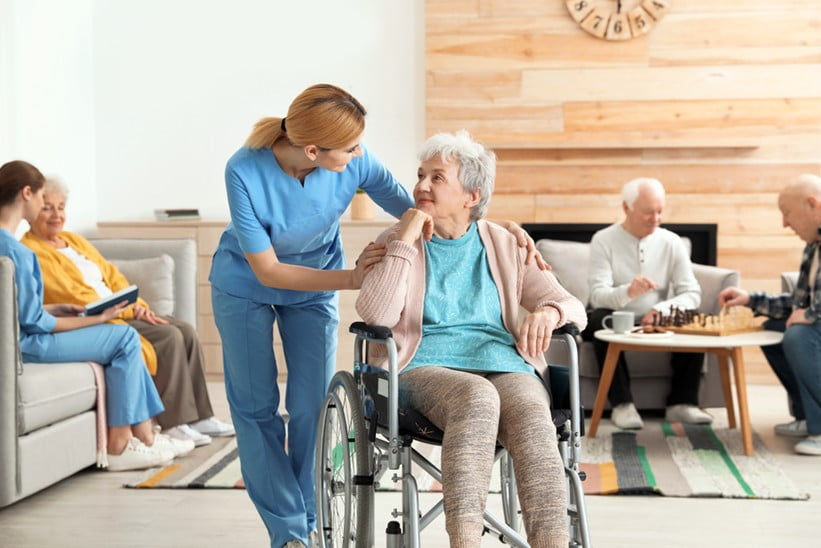
How to Help Elderly Loved Ones with the Transition to a Nursing Home
How to Help Elderly Loved Ones with the Transition to a Nursing Home? – Moving into a nursing home is a big transition for both your loved one and the whole family. Thankfully, there are practical steps you can take to ease the transition to assisted living for everyone involved. Here are eight of our top tips to help your loved one adjust to living in a nursing home for the first time:
Table of Contents
Bring a few familiar objects.
Your loved one will have to sell or donate much of their belongings, as they can only bring a limited amount of things into an assisted living facility. However, bringing a couple of small familiar objects can give them a sense of stability in a new environment. Sentimental items such as family pictures are a popular choice, as are comforting objects such as a favorite blanket or pair of hospital socks. Leave breakable, expensive or irreplaceable objects — such as fine jewelry or heirloom china — in storage or with a relative for safekeeping. Things do get lost or taken in nursing homes sometimes, or accidentally broken, so don’t bring anything your loved one would be devastated to lose.
Help with the move itself.
Moving is a highly stressful experience on its own, and moving into a nursing home is even more stressful. Even if your loved one is of sound mind and body and capable of overseeing the moving process, some extra help will absolutely be appreciated and make the process go smoother. Ask what you can do to help, whether that is boxing up elderly clothes, taking donations to the drop-off or handling communication with the nursing home. By making the move a pleasant experience, you will help your loved one acclimate faster.

Give them a sense of control.
Many elderly loved ones struggle to adjust to a nursing home because of their loss of control. Simple decisions that were formerly up to them, such as what to eat for dinner, are now made by someone else, which can be really hard to adjust to. To help your loved one, think of ways that you can give them a sense of control, such as prompting them to decide which activities they want to sign up for, giving them a small plant to take care of or getting them clothing they can put on by themselves, such as dresses for elderly women. These gestures may seem small but really will help seniors feel more adjusted to the nursing home.
Visit them often.
Seniors often feel isolated at nursing homes. Even though they are surrounded by people all the time, they are strangers who your loved one does not know. To help them acclimate, visit them as often as you possibly can. Keep the visits brief, and leave if your loved one starts to become tired, cranky and disoriented. Bring photos and videos so you can keep them updated on the family goings-on so they don’t feel like they are being left out.

Talk to the nursing home staff.
Get to know the nursing home staff, and help them get to know your elderly loved one by telling them your loved one’s likes and dislikes. The staff will eventually learn these over time, but it will help them get adjusted faster if the staff is already aware of their strongest preferences. If the nursing home has a lot of staff turnover, you might actually need to do this frequently as previous employees leave and new ones are onboarded. Being an advocate for loved one’s assisted living care often leads to better and more personal outcomes.
Encourage them to get involved.
If your loved one is able, encourage them to get involved in the activities offered by the nursing home. Sitting in their room, thinking about how much they miss their old home, will not help them get adjusted. Activities will give them something concrete to focus on, providing a distraction and helping them to pass the time. These events will also help them get to know other residents as well as the staff. Social connections will help your loved one feel less isolated and help them adjust to the nursing home. Even if they aren’t up for structured activities, still encourage them to spend time in the common areas and talk with others so they are getting social connections.

Don’t take them out until they have adjusted.
It’s tempting to take your loved ones out of the nursing home for special outings to their favorite places. Unfortunately, taking your loved ones out before they have become fully acclimated to the nursing home can prolong the adjustment period. The reminder of life outside the nursing home may make them even more moody about the fact that they are now in assisted living. Instead, visit them at the nursing home until they are adjusted to it, and then you can see about taking them out occasionally if they are up to it.
Consider getting them in therapy.
Older adults are very vulnerable to depression and anxiety, and the upsetting of their routine (through moving them into a nursing home) can cause an uptick in symptoms. If your loved one seems to be struggling with a mood disorder, then see if you can get them an appointment with a psychologist or therapist for talk therapy. The therapist might also recommend that your loved one see a psychiatrist about medication for anxiety, depression or other mental conditions. Getting the help they need can significantly improve your loved one’s quality of life and help them weather these new life changes.
Moving your loved one into assisted living is a big step, and they will probably need help acclimating to a nursing home. Follow these steps to make the transition easier on everyone and to help your loved one adapt to their new lifestyle more quickly.


